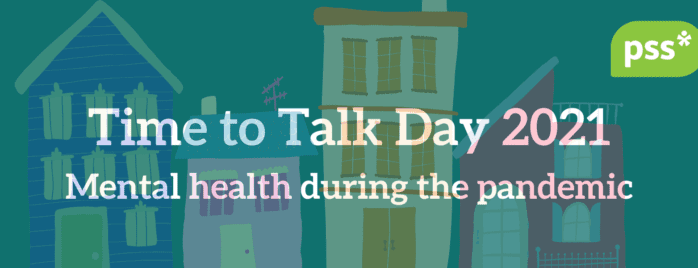February 3, 2021
Time to Talk Day 2021
Time to Talk Day 2021
It’s Time to Talk Day 2021. Time to Talk is all about removing obstacles to conversations around mental health and wellbeing. Here at PSS we always encourage the people we support and our teams to discuss their mental health, to open up with those around them and to seek support when they need it. Mental health challenges can affect any one of us and during the pandemic lots of people have faced heightened anxiety, stress, grief and/or depression.
We think it’s so important now more than ever to break down any stigma associated with discussing our mental health. One small conversation can certainly go a very long way in supporting mindfulness and more positive mental health. And these conversations don’t need to be face-to-face. During the pandemic we’ve really unlocked the potential of the virtual world in staying connected and mentally well. Despite this positive we have truly seen the impact that Covid-19 can have on not only our physical health but our mental health too.
How our mental health has been impacted by Covid-19 – a PSS podcast
Last week, Sean from our learning and development team hosted a podcast, bringing together Sandra who works in our Wellbeing Centres in Liverpool, G who is supported by the Wellbeing Centre team and Sarah who works in our Newby House mental health reablement supported living service also in Liverpool.
Everyone chatted about personal and professional experiences of the pandemic and just how much seeing people less, chatting less and being less active could open up mental health challenges for so many of us. It’s been a time for reflection and as Sandra pointed out, sometimes this reflection can be extremely difficult. For people who may be consumed by their own thoughts and who often spend lots of time analysing situations, this increased time alone makes it extremely difficult to manage mental health challenges.
G’s experience of mental health and wellbeing during the pandemic
G is supported by our Wellbeing Centre service in Liverpool to manage her anxiety and is also a peer supporter, offering her support to other people facing mental health challenges. Above is a a snap-shot of some of the things she reflected on during the podcast.
G comments on how her thoughts and emotions can actually affect her physical health and make her feel totally drained and her mood feel low. Her conversations with other people have really supported her mental health in the past and without this social aspect she’s found things difficult. She discusses how she doesn’t crave to be in a crowd or within loudness but the time spent alone really increases the time she spends thinking about things and she misses people. She describes how going on a ten-minute drive for a two-hour walk with a friend the day before was one of the most ‘precious’ moments for her during lockdown, talking about this makes her feel quite emotional. It’s this closeness that people are missing right now and you can still have this within the lockdown guidelines.
What G does stress is that the pandemic has really been a humbling experience for her in the sense that more people seem to be talking openly and honestly about their mental health – because everyone is struggling more there seems to be feeling that everyone is in this together. If there is one thing that can come good of this tremendously difficult experience, it’s that more people can share their mental health challenges and be honest about what they’re going through to support each other.
She feels that there are lots of mental health cliches emerging through the pandemic. She’s not sure how well she is ‘adapting’ to change and how she is managing things but she feels like she is doing the best she can. For her, being mentally well is a very personal thing. There isn’t one thing you should be doing, you have to do what works for you and you shouldn’t feel the pressure to try everything out there – yoga isn’t for everyone and meditation might not do the trick for you either. For G sometimes getting up, making breakfast and having a shower is a good day for her. We have to listen to our bodies and what feels doable on any one day. G explains how the Wellbeing Centres have really saved her life. They give her a new perspective, a variety of support options and an understanding that some days we just need to embrace a day off.
Our Wellbeing Centres support people with their mental health and wellbeing in Merseyside, offering personalised support. They offer a programme of group therapy sessions and activities. During the pandemic and the different lockdowns, they’ve continued to support people over the phone. Anyone can also access some of their resources via: UpbeatlLiverpool.com. If you identify as having a mental health challenge, you live in Liverpool and you’re over 18, our team may be able to support you more too. Find out more here: http://https://rhf.ce4.myftpupload.com/how-we-can-help-you/look-after-your-health-and-wellbeing/when-youre-experiencing-mental-health-worries-wellbeing-centres

